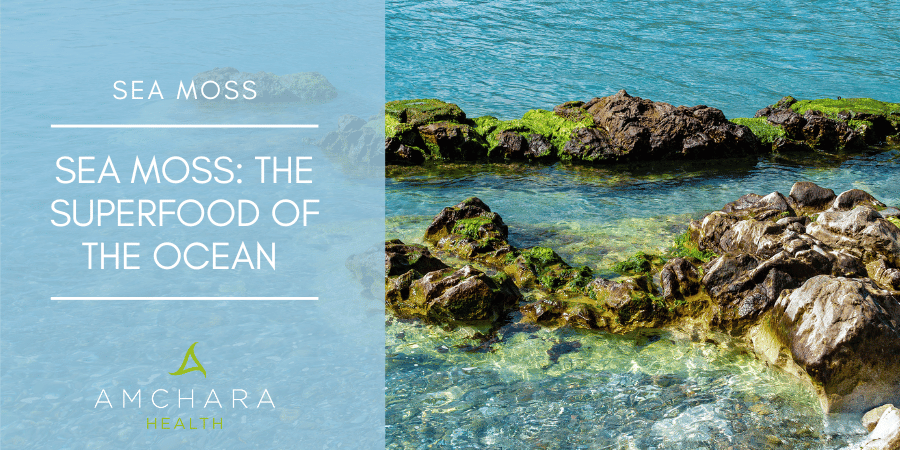Sea moss is a nutrient-rich marine vegetable that grows in sheltered inlets and tidal pools along rocky coasts, such as those of the Northern Atlantic Ocean. Its recent boom in popularity as a health supplement has arisen from increasing circulation of its rumoured health benefits, often being dubbed ‘nature’s superfood’, due to its impressive nutrient and mineral content.
In the modern internet world there is an overwhelming amount of often misinformation, especially regarding relatively new trends such as that of sea moss, which, despite having been consumed by people for centuries, is only just beginning to be researched in terms of its biological health benefits. That’s why our articles are always evidence-based and orientated towards a holistic and Personalised Health approach, to provide you with actionable knowledge and tips to help you on your journey to optimal health.
In this article, we take a look at some of these health benefits, and the science to support these exciting new discoveries.
Nutrient and mineral content
The low number of calories and low fat content of sea moss mean that it is a popular foodstuff for many health-conscious people, while its small amount of protein as well as a variety of vitamins and minerals may help to support a healthy lifestyle. Like other sea vegetables and seaweeds, it is also a great source of iodine and antioxidants, which help to protect your cells from disease – caused in part by oxidative damage.
Here is a breakdown of the key nutrients of sea moss:
According to the US Department of Agriculture, a 20-gram serving of sea moss contains:
Supporting the thyroid
The thyroid gland is responsible for regulating numerous bodily functions, including metabolism, energy production, and hormone balance. Sea moss is a natural source of iodine, a mineral crucial for proper thyroid function. Regular consumption of sea moss helps ensure adequate iodine levels, which can support a healthy thyroid and contribute to improved energy levels and hormonal equilibrium.
However, if you are already taking medication to support your lack of iodine it is probably worth doing further research or speaking to a health practitioner.
Boosting the immune system
The immune system is our body’s natural defence against illness and infection. Sea moss is known for its immune-boosting properties due to its rich content of antioxidants, vitamins and minerals. Vitamin C, present in sea moss, plays a crucial role in supporting the immune system and protecting against oxidative stress. By introducing even just small amounts of sea moss into your nutritional intake, you can fortify your body’s defence mechanisms and enhance your overall immunity.
In fact, while no specific human study has been conducted yet, one study into salmon found that supplemental sea moss helped improve immune modulation and immune response.
Enhancing digestive health
Sea moss is an excellent source of dietary fibre, making it a valuable ally for digestive and gut health. The fibre content aids in promoting regular bowel movements, preventing constipation and supporting a healthy gut microbiome.
Additionally, sea moss contains natural prebiotics that nourish beneficial gut bacteria, promoting optimal digestion and nutrient absorption.
Skin health and beauty
Sea moss possesses remarkable benefits for the skin. Its high concentration of vitamins and minerals, coupled with its anti-inflammatory properties, can help combat various skin conditions, including eczema, acne, and psoriasis.
Sea moss is also believed to promote collagen production, aiding in skin elasticity and reducing the appearance of wrinkles. Including sea moss in your diet can contribute to a vibrant, youthful complexion.
Cardiovascular health
Sea moss contains a unique blend of vitamins, minerals, and antioxidants that promote heart health. Its potassium content helps regulate blood pressure levels, reducing the risk of hypertension. Additionally, sea moss’s fibre content aids in managing cholesterol levels, supporting a healthy cardiovascular system.
In particular, some studies have demonstrated that seaweeds and microalgae reduce the presence of LDL (‘bad’ cholesterol) and acts as a blood thinner, which may help to reduce the risk of heart disease.
Preventing diseases
Early studies suggest that as well as boosting the immune system, sea moss may also even be able to prevent both salmonella and Parkinson’s disease.
One study showed that sea moss can stop the growth of S. enteritidis, the bacteria that causes salmonella in humans. However, it is important to realise this is a very early study with more research being needed to determine whether sea moss could help prevent or treat salmonella.
In addition, in a study carried out with worms, extract from sea moss was shown to reduce stiffness and slowness movement, which could indeed mean promising things for people with the degenerative Parkinson’s disease. Again, more research is needed to confirm whether sea moss can exert the same effect on humans as it does on worms.
Mental clarity and mood enhancement
The brain requires essential nutrients in order to function optimally, and sea moss provides several of these crucial elements. Its rich content of vitamins, minerals, and antioxidants, including two times the mood-boosting potassium of a banana, supports brain health, enhancing mental clarity and focus.
Additionally, sea moss contains amino acids that may help balance neurotransmitter levels, potentially benefitting mood and overall wellbeing.
Takeaway
Sea moss may well deserve its popular status as nature’s superfood due to the wide range of potential health benefits it offers. From promoting digestive health and boosting the immune system to supporting thyroid function and enhancing skin health, sea moss could offer a holistic approach to wellbeing.
Although it is a relatively new discovery and much more research is needed in order to confirm the extent of its health benefits on humans, the preliminary tests are promising and there is no arguing with the alga’s impressive nutrient and mineral content.
It’s also worth remembering that sea moss should be taken in moderation due to the various unknowns, and always as a supplement to a healthy and balanced diet.
If you want to further supplement and boost your health through the exploration of various methods, why not come to Amchara for a relaxing detox health retreat in our tranquil surroundings? With expert advice on hand from our experienced Personalised Health practitioners, you can benefit from advice, tailored to your needs and goals to help you maximise your health gains.
Juicing and fasting may be recommended, according to your individual status and unique health needs.
You will be immersed in a supportive and nurturing environment that enables you to switch off, relax and kickstart your health journey, including physical activities and empowering, educational talks.
Or why not try Amchara Juicery – cold-pressed, nutritious juices delivered to your door to help you boost your health, naturally. Created by Amchara’s expert in-house health team, you can enjoy a range of fresh, organic juice cleanses (and super soups) at home.




